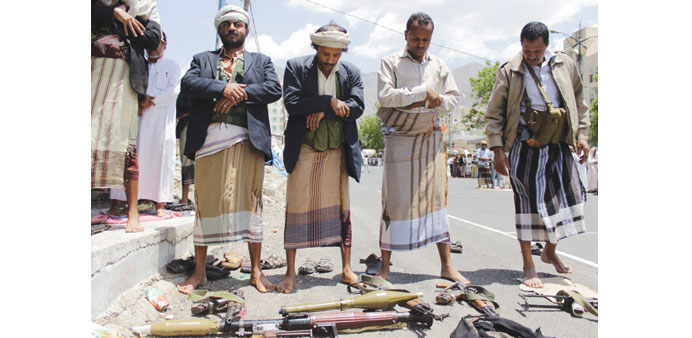Armed men, from the Popular Resistance Committees loyal to Yemen’s President Abd-Rabbu Mansour Hadi, perform Friday prayers following a demonstration in the strategic city of Taez yesterday in support of the Saudi-led operations against Houthi rebels.
The delivery of humanitarian aid and fuel has virtually halted, with the ICRC describing the situation as “alarming” and UN chief Ban Ki-moon saying relief operations could stop “within days”
AFP
Aden
The UN Security Council began closed-door consultations yesterday on the conflict in Yemen, where fuel shortages are threatening relief operations as Saudi-led air strikes enter a sixth week.
Russia requested the 15-member Council meet to at least clinch a humanitarian pause in the fighting, which UN agencies and the International Committee of the Red Cross (ICRC) say is also putting hospitals at risk.
The latest strikes and clashes on the ground killed 47 people in Yemen’s second city of Aden, where the Red Cross also scrambled to evacuate staff and patients from a hospital when it became a frontline.
And after a meeting in Riyadh, Gulf Arab foreign ministers rejected any moves to hold Yemen peace talks at a neutral venue, as sought by Iran.
The conflict escalated in March when a Saudi-led coalition launched strikes against Iran-backed Shia rebels who overran much of the country, forcing President Abd-Rabbu Mansour Hadi to flee.
The bombing has virtually halted the delivery of humanitarian aid and fuel, with the ICRC describing the situation as “alarming” and UN chief Ban Ki-moon saying relief operations could stop “within days”.
“After a month of air strikes and fighting, Yemen’s health system is struggling to cope and there are severe shortages of essential items especially food and fuel,” said the ICRC.
The World Food Programme said it was halting its food distribution as most stocks of fuel were in rebel hands.
“Humanitarian operations will end within days unless fuel supplies are restored,” said Ban.
The World Health Organisation said as of Monday 1,244 people had been killed in fighting in Yemen since March 19.
WHO receives its statistics from health facilities in Yemen, but since many people are unable to get to hospitals for treatment the real numbers are probably higher.
The International Organisation for Migration said since mid-March more than 12,000 people have fled the violence in Yemen.
The Red Cross deplored the healthcare situation, with doctors saying they are under huge strain as supplies have dwindled.
“The surgical team from the ICRC and all local staff and patients were forced to evacuate Aden’s Al Jumhurriya hospital when the building itself became a frontline in the fighting,” it said.
The ICRC said hospitals should be spared.
“We are shocked by the lack of respect for the hospital, as a neutral health facility, by the fighting parties,” said its Yemen mission chief, Cedric Schweizer.
Doctors spoke of hardship.
“We are running out of diesel. Our ambulances can no longer transport patients. Only half of our staff can come to work as the hospital buses have stopped running,” said Issa Alzubh, head of Sanaa’s Al Kuwait hospital.
A doctor in Aden, Adel al-Yafyi, said his hospital was now unable to care for ordinary patients as it was being flooded by those wounded in combat or air strikes.
The WHO said the collapse of access to healthcare had also fanned the spread of epidemic diseases, with 44 alerts of suspected outbreaks of diseases including measles, dengue fever and meningitis.
Alexey Zaytsev, spokesman for the Russian mission at the UN in New York, said Moscow called for the Security Council consultations “because the situation is very bad in Yemen”.
Last week, Riyadh announced a halt to the air war but since then it has kept up daily strikes.
Saudi King Salman and his son and Defence Minister Prince Mohamed have said repeatedly it will go on until the rebels concede.
Gulf foreign ministers on Thursday insisted UN-brokered talks must only take place in Saudi Arabia.

